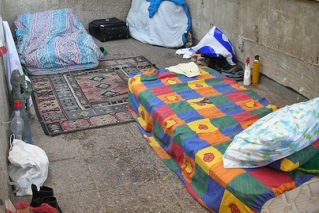 CC-BY-NC-SA Yoav Lerman
CC-BY-NC-SA Yoav Lerman
Tomorrow (Thursday July 11) the Supreme Court will hold a hearing on an appeal filed by the Tel Aviv-Jaffa Municipality against a lower court decision that prevents municipal inspectors from clearing out homeless people or confiscating their property.
The Association for Civil Rights in Israel (ACRI) filed the original motion in November 2011 on behalf of itself and several homeless persons, claiming harassment and abuse by city inspectors: forced removal from public spaces, separation from other individuals, and confiscation of the basic equipment necessary to their survival. On November 19 2012 the Tel Aviv Administrative Court ruled that the municipality cannot exclude homeless people from public spaces or confiscate their personal property unless there is substantial nuisance or injury, and even then only in accordance with written procedures.
In its appeal, he Municipality claimed that the lower court’s decision grants “privilege” to homeless people to be present anywhere in the public sphere, and that the confiscation of their possessions flows from the city’s obligation to remove nuisances and keep order and cleanliness in public spaces.
The Attorney General, ordered by the Supreme Court to join the proceedings and submit his position, stated that substantial weight should be given to the interests of homeless people to be present in the public sphere and account should be taken of the fact that homeless people have no private space to retreat to. According to the Attorney General’s position, proper balancing of the interests would allow the municipality to remove the belongings of a homeless person (which in practice means removing the person) only if their presence prevents the rest of the public from using the public space or substantial harms the possibility of the public to make reasonable use of the space.
In his reply to the appeal, ACRI Attorney Gil Gan-Mor stressed that municipal inspectors’ removal of homeless people’s personal property constitutes pointless cruelty that violates the homeless’ rights to dignity, freedom, property and due process. Since homeless people have no choice other than to be present in the public sphere, outlawing the equipment that allows them sleep and survive turns them into criminals against their will and essentially negates their right to exist.
“A policy that turns homeless persons into criminals just because they are homeless is not only cruel, it’s ineffective. Aside from the suffering of the homeless, the policy will result in their being pushed out to the most marginalized neighborhoods where municipal inspectors won’t harass them. The national and municipal welfare systems do not provide homeless people with adequate shelters, let along permanent housing solutions, and most have no choice other than to live and sleep in the street. The municipality should be investing its energies in helping the homeless, not mistreating them”
Related Materials







